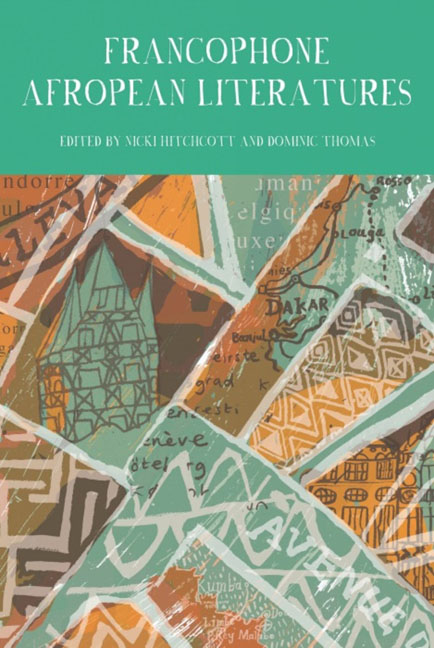Book contents
- Frontmatter
- Contents
- Introduction: Francophone Afropeans
- Essays
- Afropeanism and Francophone Sub-saharan African Writing
- The Transatlantic Poetics of Fatou Diome
- Corps Sans Titre: ‘Fleshiness’ and Afropean Identity in Bessora's 53 Cm
- Already Here: Sami Tchak's Afropean Generation
- Paris Polar: Afropean Noir in the City of Light
- Mapping Afropea: The Translation of Black Paris in the Fiction of Alain Mabanckou
- Relighting Stars and Bazaars of Voices: Exchange and Dialogue in Leonora Mianos Tels Des astres eteints and Alain Mabanckous Black Bazar
- Sex and the Afropean City: Léonora Miano's Blues Pour Élise
- Towards an Afropean Cosmopolitanism: Hospitality, Friendship and the African Immigrant
- Afropean Masculinities as bricolage
- Short Stories
- Notes on Contributors
- Index
Afropean Masculinities as bricolage
from Essays
- Frontmatter
- Contents
- Introduction: Francophone Afropeans
- Essays
- Afropeanism and Francophone Sub-saharan African Writing
- The Transatlantic Poetics of Fatou Diome
- Corps Sans Titre: ‘Fleshiness’ and Afropean Identity in Bessora's 53 Cm
- Already Here: Sami Tchak's Afropean Generation
- Paris Polar: Afropean Noir in the City of Light
- Mapping Afropea: The Translation of Black Paris in the Fiction of Alain Mabanckou
- Relighting Stars and Bazaars of Voices: Exchange and Dialogue in Leonora Mianos Tels Des astres eteints and Alain Mabanckous Black Bazar
- Sex and the Afropean City: Léonora Miano's Blues Pour Élise
- Towards an Afropean Cosmopolitanism: Hospitality, Friendship and the African Immigrant
- Afropean Masculinities as bricolage
- Short Stories
- Notes on Contributors
- Index
Summary
Afropean literary narratives exhibit a discursive preoccupation with masculinity that is not necessarily present or sustained in earlier literatures focusing on the African presence in France. This novel preoccupation aligns with the frenzied coalescence, starting in the mid–1990s and peaking in 2005, of a latent, and hence hitherto unmined, French public discourse on Afropean masculinities. In the early 1980s, the African immigrant woman took centre stage as a national problem, when the politicization of the immigration question and the ensuing debates on citizenship and nationality targeted her alleged excessive fertility (see Freedman, 2000: 13–18; Raissiguier, 2010: 72–90). If the new focalization of the immigration question upon the Afropean male has not been fully addressed in scholarship on immigration and Frenchness, Afropean literary discourse has certainly engaged with the troping of the Afropean male: a discursive event, in the sense that this irruption of masculinity on to the French landscape has caused a shift in discourse and introduced a new regime of representation of Afro–descended French populations.
The figure of the Afropean male has, accordingly, come to constitute a prime discursive site for writers such as Sami Tchak, Alain Mabanckou and Léonora Miano. This chapter proposes to explore the ways in which the protagonists in these writers’ projects place Africanness and Europeanness under duress, but it is also interested in sketching pathways between, into, across and away from these categories. In their shared deconstructive concerns with the identity scripts of Afropean masculinities, Place des fêtes (2001) by Sami Tchak, Tel des astres éteints [Like Extinguished Stars] (2008) by Léonora Miano and Black Bazar [2009; Black Bazaar, 2012] by Alain Mabanckou exemplify how Afropean literary texts are reflecting and deflecting the French societal anxieties displaced on to the trope of the Afropean male. The ideological model of Afropean masculinities that these writers develop is of particular interest for its unapologetic and uninhibited investment in disentangling, by way of bricolage, the Afropean male subject from narratives and projects of collective identity. The notion of bricolage, employed here as a (counter)practice of identity, articulates post–identitarian idioms of self–understanding, identification and affiliation. Through the masculinities of bricolage thus proposed, a new face of Afropeanism is revealed in engagement with post–identitarianism and most certainly in grand contemplation of the ‘planetary humanism’ or ‘postrace humanism’ envisioned by Paul Gilroy (2000).
- Type
- Chapter
- Information
- Francophone Afropean Literatures , pp. 155 - 170Publisher: Liverpool University PressPrint publication year: 2014



